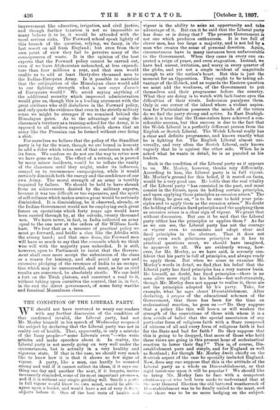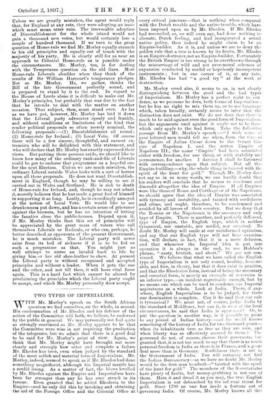THE CONDITION OF THE LIBERAL PARTY.
WE should not have ventured to weary our readers with any further discussion of the condition of that confirmed invalid, the Liberal party, had not Mr. Morley himself in his speech of Wednesday reopened the subject by declaring that the Liberal party was not in reality out of health. That, apparently, is only a mistake of the fussy people—" some Liberals even "—who write articles and make speeches about it. In reality, the Liberal party is not merely going on very well under the circumstances, but is actually in a very healthy and vigorous state. If that is the case, we should very much like to know how it is that it shows so few signs of vigour. A party, like a man, can hardly be counted strong and well if it cannot collect its ideas, if it says one thing one day and another the next, if it forgets, unless incessantly reminded, some of its most important promises, and if it is without any single guiding will. Surely a pArt■ in full vigour would know its own mind, would be able agree upon a leader, and would have a set of very drfi •I. objects before it. One of the best tests of health aid vigour is the ability to seiee an opportunity and take advantage of it. But can it be said that the Liberal party has done or is doing that ? The present Government is not one which produces enthusiasm. It is too full of clever men, has too large a majority, and is not led by a man who creates the sense of personal devotion. Again, circumstances have in many instances been unfavourable to the Government. When they came in every one ex- pected a reign of peace, and even stagnation. Instead, we have had unrest, irritation, and worry in every quarter of the globe, and yet not a single incident of magnitude enough to stir the nation's heart. But this is just the moment for an Opposition. They ought to be taking ad- vantage of the ill-luck, and as regards the Eastern question we must add the weakness, of the Government to put themselves and their programme before the country. What they are doing is to watch with lack-lustre eyes the difficulties of their rivals. Indecision paralyses them. Only in one corner of the island where a violent aspira- tion for Particularism possesses the minds of the voters do we find the party strong and active. In East Denbigh- shire it is true that the Home-rulers have achieved a con- siderable success, but this success is due to the fact that the Welsh Liberal is a perfectly different person from the English or Scotch Liberal. The Welsh Liberal really has a clear and definite programme, and knows exactly what he is fighting for. The English Liberal almost uni- versally, and very often the Scotch Liberal, only knows vaguely that he is against the other side. When he is asked what he wants in detail, he is as puzzled as his leaders.
Such is the condition of the Liberal party as it appears to us. Mr. Morley, however, thinks very differently. According to him, the Liberal party is in full vigour. Mr. Morley's ground for this belief, if it rested on facts, would be a very good one. He bolds that the real vitality of the Liberal party " has consisted in the past, and must consist in the future, upon its holding certain principles, and upon applying those principles as occasion arises." The first thing, he goes on, " is to be sure to hold your prin- ciples and to apply them as the occasion arises." No doubt the holding of certain fixed principles and the applying them as occasion arises is a clear sign of vigour. We grant that without discussion. But can it be said that the Liberal party either has the principles or applies them ? As far as we can see, the Liberal party has not the courage or vigour even to enunciate and adopt clear and fixed principles in the abstract. That it does not apply even such gelatinous principles as it has to practical questions must, we should have imagined, be apparent to all. We are evidently wrong, how- ever, for Mr. Morley, as we have said, is serenely con- fident that his party is full of principles, and always ready to apply them. But when we come to examine Mr. Morley's words in detail, we find,that his belief that the Liberal party has fixed principles has a very narrow basis. He himself, no doubt, has fixed principles—there is no man alive more rigid in his beliefs—but unfortunately, though Mr. Morley does not appear to realise it, these are not the principles adopted by his party. Take, for example, what he says about Disestablishment. After declaring, a propos of the educational schemes of the Government, that there has been for the time an ecclesiastical reaction, he goes on :—" Do they suppose that a policy like this will lessen or will weaken the strength of the convictions of those with whom it is a firm article of belief that the special association of any particular form of religious faith with a State composed of citizens of all and every form of religious faith is bad for the State and bad for faith ? Do they suppose that this is going to be dropped, that more of those who hold these views are going in this present hour of ecclesiastical reaction to lower their flag ?" This is, of course, Dis- establishment pure and simple, and for England as well as Scotland ; for though Mr. Morley dwelt chiefly on the Scottish aspect of the case he specially included England. Now, does any one suppose that this is the attitude of the Liberal party as a whole on Disestablishment, or that rigid insistence upon it will be popular ? We should like to bring Mr. Morley face to face with a competent election-agent who had been made to understand that at r h. next General Election the old battered weathercock of ll,,establishment was to be finally nailed to the mast, and hat there was to be no more hedging on the subject. Unless we are greatly mistaken, the agent would reply that, for England at any rate, they were adopting an issue which must mean utter ruin. The irrevocable adoption of Disestablishment for the whole island would not gain a thousand new votes, but would certainly lose a couple of hundred thousand. If we turn to the great question of Home-rule we find Mr. Morley equally staunch to his old principles and equally out of touch with the majority of his party. He is clearly still for as near an approach to Colonial Home-rule as is possible under the circumstances. Mr. Morley, too, is for dealing with the Temperance question on the old lines. Most Home-rule Liberals shudder when they think of the results of Sir William Harcourt's temperance pledges. Not so Mr. Morley. He, we gather, thinks the Bill of the late Government perfectly sound, and is prepared to stand by it to the end. In regard to the House of Lords alone it is difficult to make out Mr. Morley's principles, but probably that was due to the fact that he intends to deal with the matter on another occasion. That subject, then, must stand over. As far as we have got, however, Mr. Morley has laid it down that the Liberal party advocates openly and frankly, and without conditions or limitations of the kind that render political proposals so often merely nominal, the following proposals :—(1) Disestablishment all round ; (2) Home-rule for Ireland ; (3) Local Veto. Of course there will be a few sincere, thoughtful, and earnest ex- tremists who will be delighted with this statement, and who will declare that Mr. Morley has exactly expressed their views. But putting these persons aside, we should like to know how many of the ordinary rank-and-file of Liberals could be got to endorse that programme as a hopeful one for the next Election. Unless we are much mistaken, the ordinary Liberal outside Wales looks with a sort of horror upon all these proposals. He does not want Disestablish- ment in England, though he may be willing to see it carried out in Wales and Scotland. He is sick to death of Home-rule for Ireland, and, though he may not admit it, secretly believes that he has made a great fool of himself in supporting it so long. Lastly, he is exceedingly annoyed at the notion of Local Veto. He would like to see drunkenness put down, and has a certain sense of grievance against the brewers, but he has no intention of letting the fanatics close the public-houses. Depend upon it, if Mr. Morley thinks that this set of principles will be appreciated by the great mass of voters who call themselves Liberals or Radicals, or who can, perhaps, be better described as opponents of the present Government, he is much mistaken. The Liberal party will never arise from its bed of sickness if it is to be fed on such a programme as that. You might just as well attempt to nurse an invalid back to life by giving him or her old shoe-leather to chew. At present the Liberal party is without recognised and accepted principles and without a leader. When it gets the one and the other, and not till then, it will have vital force again. This is a hard fact which cannot be altered by proclaiming the principles which the Liberal party ought to accept, and which Mr. Morley personally does accept.







































 Previous page
Previous page